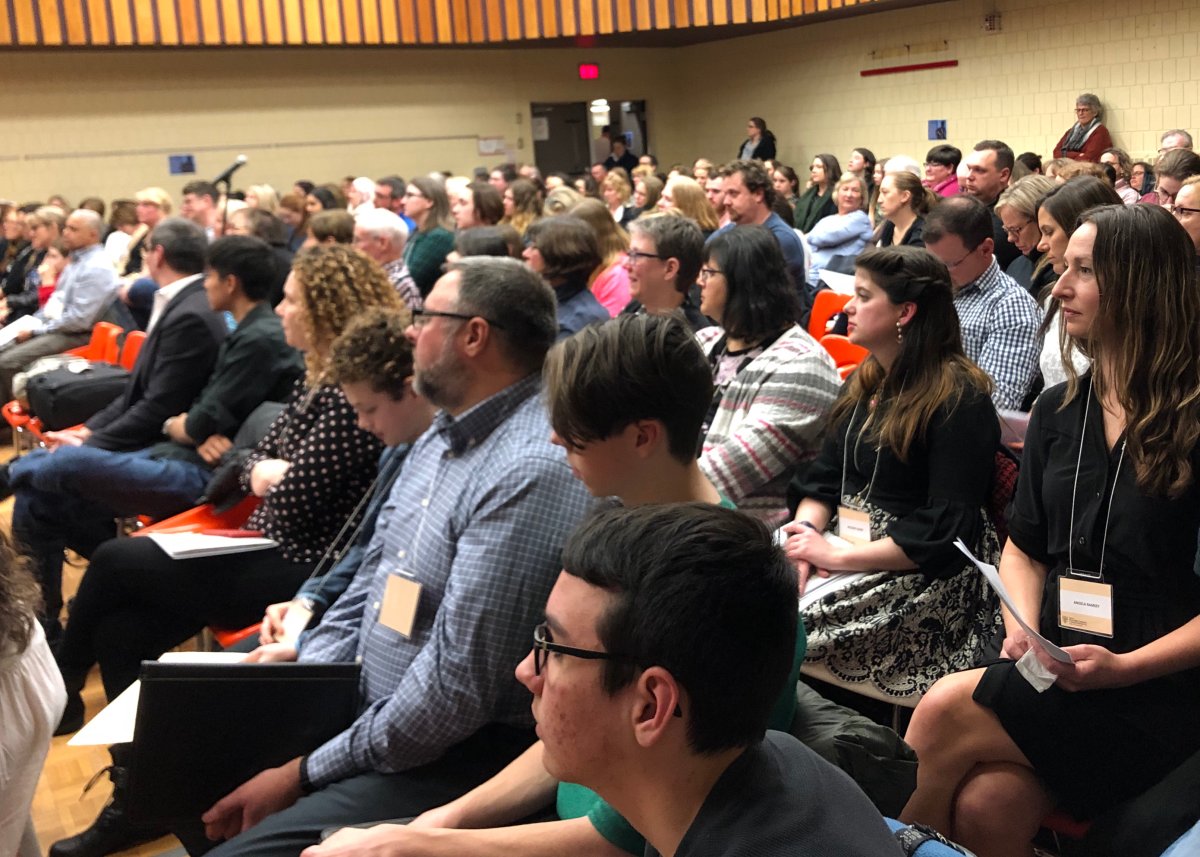It was an emotional night for those participating in the Right to Read inquiry in London, as parents and children spoke about the struggles kids with reading disabilities face in the Ontario education system.

The Ontario Human Rights Commission announced the Right to Read inquiry in October to investigate if children with reading disabilities are being treated fairly in the education system.
Over 200 people showed up at the hearing at the Amethyst Demonstration School Auditorium in London, with some travelling from as far away as Kitchener and Waterloo for the chance to speak.
Wednesday night was the second of four public hearings where children, their parents, and other stakeholders had the opportunity to speak to the panel about their experiences.
“With my younger two children, I have experienced similar stories to all of you, the late diagnosis at the end of grade three, being told to just read to them and they will learn to read, watching helplessly as your child grows further and further behind,” parent Amanda Lockhart said.
Fighting back tears, Lockhart spoke about the struggles her two youngest children have faced.
“Many nights, they can’t sleep because they feel stupid that they aren’t like other kids and I have spent thousands of dollars on tutors just to keep their heads above water.”
Having moved to Ontario in 2018, Lockhart explained how her children were put on individual education plans (IEP), which she said was not properly explained to her and did not help their development.
Lockhart said it was not until she joined groups for parents with learning disabilities that she learned about the damage a modified education plan could have.
“When you put your children on a modified program, they are taking away their chances to attend college or university by changing the pathway of their learning,” she said.
“I heard people in the education system themselves speak of how they would not put their children on a modified program.”

Lockhart said she felt she had failed her kids as a parent and essentially erased all the hard worth they had done through tutoring to remain at grade level.
What Lockhart spoke about was not that different for the many parents who talked about the barriers getting their children diagnosed, the cost associated with that diagnosis, and the lack of resources available to help.
Several parents spoke about the long wait to get their children a psychological assessment through the school system and choosing to pay out of pocket to get a diagnosis.
According to Kindercare, a pediatric health centre based out of Toronto, a psychological assessment costs $600 to $1,500 for a cognitive assessment and upwards of $2,000 to $3,500 for a psycho-educational assessment.
“Both of our kids have been diagnosed with dyslexia, dysgraphia, and dyscalculia by phycologists,” said Jeff Barnard.
“We had to pay for it out of our own pocket.”

Speaking at the commission, Jeff Barnard, his wife Michelle and two sons, Brody and John, spoke about Brody and John’s learning challenges.
“In grade five, he told us he wanted to kill himself for being stupid. No children should ever have to feel this way, especially when something could have been done.”
Jeff explained that after teachers ignored his one son’s first assessments, he paid for a second one a few years later, and then a third when his son was in high school to prove that he still had a learning disability.
Dyslexia is a genetic condition that is passed down through families and does not fade with age.
The Ontario Human Rights Commission said data from the province’s Education Quality and Accountability Office suggests an alarming number of students are falling short of reading standards in elementary school, setting them up for life-long struggles.
According to EQAO statistics for grade three students, 25 per cent were found to be falling behind the provincial standard. For students with a disability, that number was more than double at 53 per cent.
The commission said Ontario’s curriculum is based on outdated science and fails to properly support disabled students, which, in turn, deprives them of a fundamental skill.
Speaking at Wednesday night’s hearing, Chief Commissioner Renu Mandhane said they have already been contacted by over 1,000 individuals and organizations to share their stories.
“For over 20 years, The Human Rights Commission has promoted the right to education for students with disabilities,” she said.
“Yet we continue to hear there is a wide gulf between the vision of the code and realty in our classroom.”
Two more public hearings are scheduled for Thunder Bay on Feb. 25 and Ottawa on March 10.
Following the hearings, a public report is expected later in the year.
With files from By Michelle McQuigge The Canadian Press








Comments